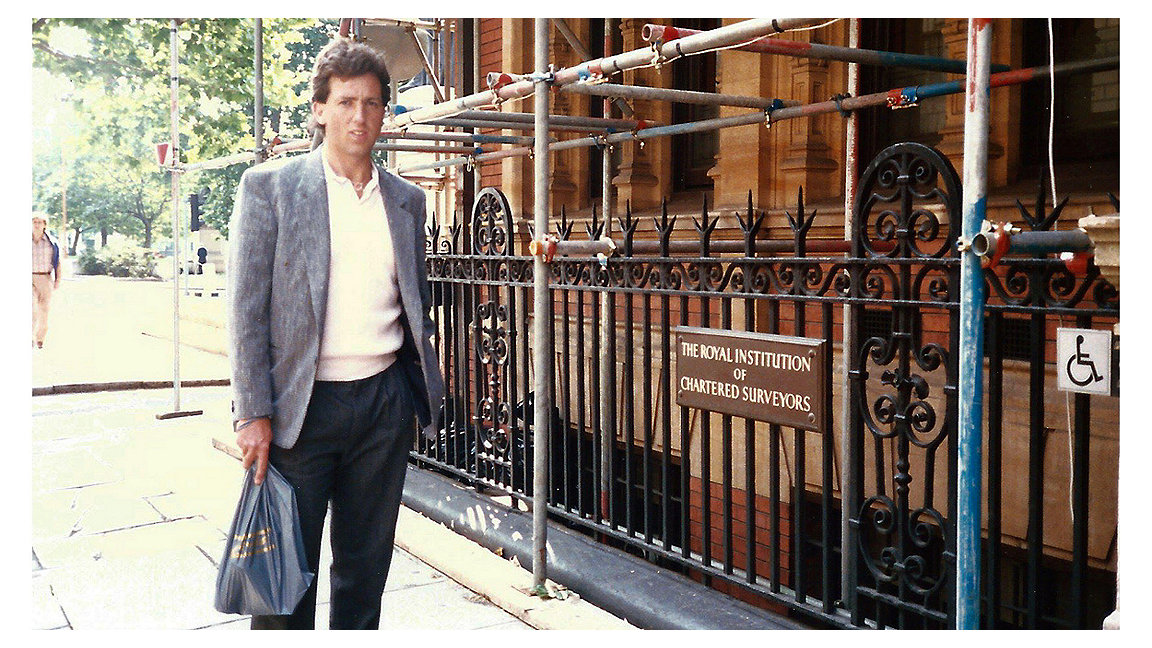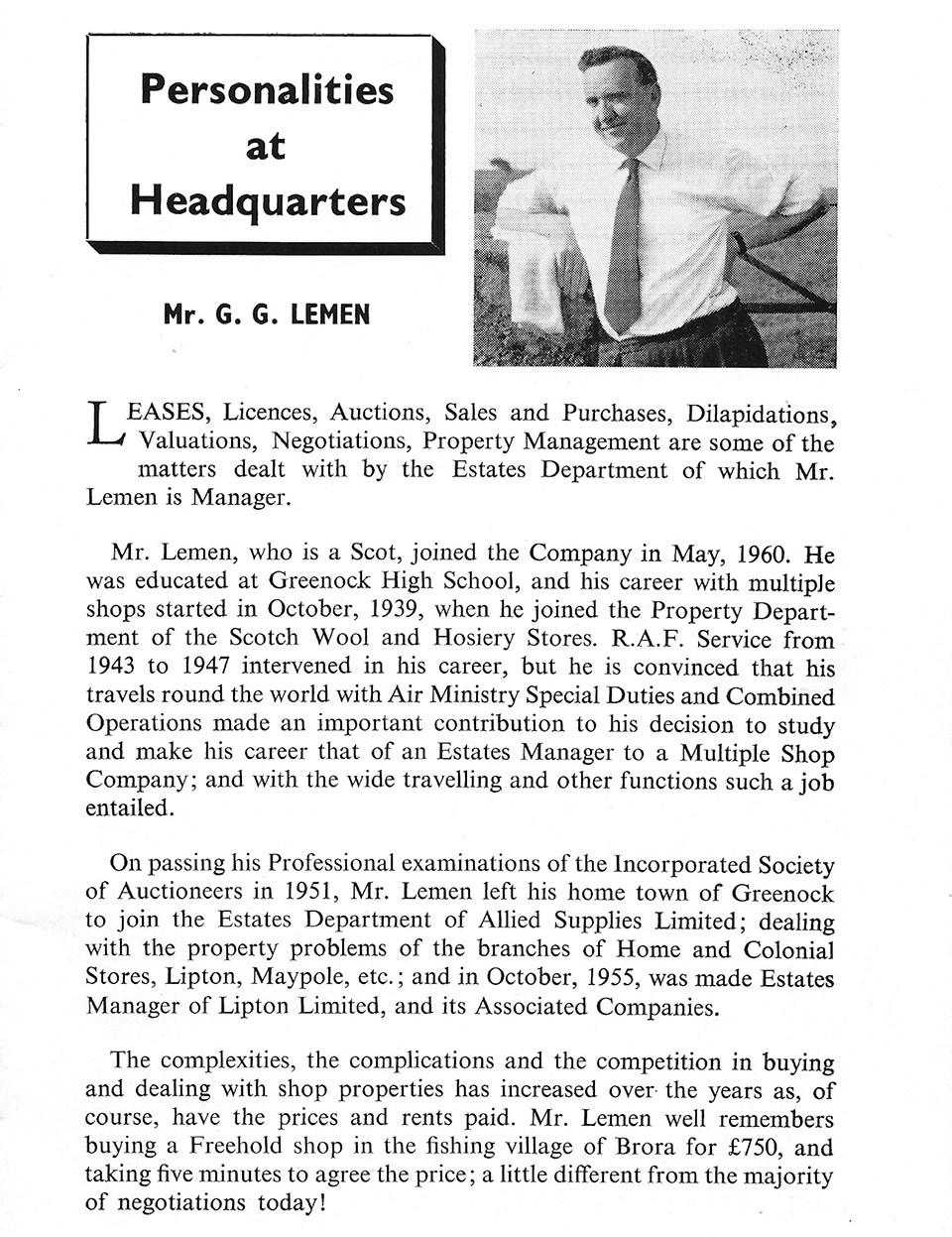
Don Lemen in front of the RICS headquarters in 1986 © Jen Lemen
I never intended to become a chartered surveyor.
After leaving school, I initially started a degree in sports and exercise science at the University of Bath. However, studying full-time and the lack of career opportunities I could see prompted me to question my decision. So after a year and a half, I left the course and reconsidered my options.
Enter my father and grandfather: both chartered surveyors in the commercial property sector.
Following in the family's footsteps
My granddad, George Lemen, left school at the age of 14 and joined the property department of Fleming, Reid & Co. as an office junior. During the Second World War, he was a flight sergeant in the RAF and a wireless operator on D-Day on HMS Bulolo, a headquarters ship directing landing operations on Gold Beach. After D-Day, he was deployed in east Asia.
Following the war, he rejoined the company and qualified by taking a correspondence course with the Incorporated Society of Auctioneers and Landed Property Agents, which has since become part of RICS. He eventually joined the jewellers H. Samuel, spending the majority of a successful career as the firm's estates director.
Like father, like son. My dad, Don Lemen, left school and then joined Edwards, Bigwood & Bewlay as a trainee surveyor, also becoming chartered by taking a correspondence course, this one with the College of Estate Management.
He has only recently retired, having spent most of his career working with Land Securities, Donaldson's, DTZ and Cushman & Wakefield, specialising in shopping centre property and facilities management, as well as attaining RICS fellowship.
These positive role models inspired me to consider a career as a chartered surveyor. Growing up, I had also enjoyed the opportunity and experience of spending time with my dad when he was working, visiting shopping centres both in the UK and abroad.

George Lemen meets Winston Churchill © Jen Lemen
Resuming study – with a salary
After leaving Bath I wanted to find a way to avoid full-time study and earn a salary while gaining practical experience. At the time, the University of the West of England, Bristol, offered a five-year, part-time BSc (Hons) in property management and investment.
As well as enrolling on the course, I found employment as a trainee at Seagrove & Lambert Surveyors in the city, pursuing my studies on a day-release basis.
After two years, I accepted a new role at Rapleys, also based in Bristol. I then switched to distance learning, allowing me to take on more responsibilities with the company and gain wider work experience.
I finally graduated with a first-class degree and an overall average of 91%. I was also awarded the RICS South West regional prize for high achievement.
A year later, I was proud to qualify as a chartered surveyor. The process was not easy, with the intense combination of work and study before preparing for a final professional interview.
My dad came with me to the RICS Bolton interview location, knowing exactly what I was going through and being able to offer the professional and personal support that I needed on the day.

Company profile of George Lemen © Jen Lemen

Article about George Lemen © Jen Lemen
Rising through the ranks
After qualifying, I proceeded through the career ranks before leaving to set up in practice with my business partner, career-long mentor and friend Rachel Saint.
As well as establishing an RICS-regulated firm, Projekt, we founded a successful training and support company for prospective chartered surveyors, Property Elite. I have also since attained an RICS fellowship, inspired by both my surveying relatives.
Interestingly, we all three took similar routes into surveying, combining distance learning with working. I think that if apprenticeships had been an option at the time each of us entered the profession then we would all have considered what is now the level 6 chartered surveying apprenticeship.
As it was, we all followed the commercial property pathway, now commercial real estate, although we each entered different parts of this sector. I first specialised in landlord and tenant relationships and now in training and lecturing, my dad in shopping centre management, and my granddad on the client side for a national high-street retailer.
'We all three took similar routes into surveying, combining distance learning with working'

George Lemen, Don Lemen and Jen Lemen © Jen Lemen
Ethical commitment and love of travel passed on
Many things have stayed the same over the generations: the essential skills of being an ethical professional, enjoying working with other people, and having the technical knowledge and understanding to advise clients cross the generations.
A big believer in acting morally, as a good human being, my granddad passed this commitment on to my dad, and now to myself, in our professional and personal lives. I also know that we have all made lifelong friendships through the profession and learned many lessons along the way, including business skills, interpersonal skills and how to enjoy a good work–life balance.
My granddad travelled across the UK to manage the H. Samuel portfolio, while my dad had the opportunity to go further afield to places such as Washington DC, Portugal and Dubai during his working life. I too have visited most of the UK as part of my surveying work. The opportunity to travel and not be desk-bound all day, every day, is certainly something we have appreciated.
Use of technology increases across generations
We have all encountered different challenges, though, particularly given the increasing use of technology in the surveying field. My dad told me about how, when he went on family holidays as a child, my granddad would have to use old-fashioned red telephone boxes to call back to the office.
There was no way for them to contact him otherwise, and sometimes he had to deal with transactions or issues that arose during his leave.
When in the office, my granddad would open his post and deal with this each day – this is very different to the constant email correspondence of 2023. My dad, by contrast, experienced the rise of IT during his time as a surveyor.
In his earlier years, he had a bleeper that would alert him to call his office when he was on site or an inspection. He was subsequently given an enormous mobile phone, later switching to a Blackberry and then a smartphone.
Dad also experienced the rise of email as a method of communication, and the office environment becoming less formal, being able to work remotely and dress codes becoming less stringent.
This leads us to 2023, where I can work from anywhere in the world using my laptop and smartphone. I can access anything and everything I need, communicate with my clients using video calls, and receive only a few physical letters.
Even leases and formal documents can now be issued and signed electronically. This has sped up our work, although it can be overwhelming with the constant stream of replies.
'We have all encountered different challenges, particularly given the increasing use of technology in the surveying field'
Profession becomes more specialised over time
However, the move from the office to hybrid working comes with its own issues. All three of us have worked in offices and benefited from the experience and support of our colleagues.
Sitting at a desk and overhearing conversations between colleagues, chatting by the coffee machine or working together on projects brings a wealth of knowledge and experience that just can't be gained from reading books or working from home. This is perhaps one of the key things that early-career professionals are potentially missing out on today.
I also think that the nature of our work has become more siloed. My granddad was literally at the heart of retail at H. Samuel – he knew everything about anything to do with the business and property.
He and my grandmother – who was not employed by H. Samuel but would accompany my granddad on business trips – would clear out properties after they had been acquired, and he was then involved with the fit-outs and dealing with the properties throughout their life cycle. He was far more of a traditional general practice surveyor than we perhaps see today.
My dad started his career with a wide role, being involved in property management, marketing, retail, HR and operations for some of the UK's largest shopping centres. By the later stages of his career his role was far narrower, with the other aspects having been split into separate teams or departments.
By comparison, I started in a general practice role working for a sole practitioner and then become a little more specialised in landlord and tenant work, before expanding my practice and horizons again through Projekt and Property Elite.
It is safe to say, though, that choosing a career in chartered surveying was an extremely sound decision, and none of us ever looked back. Being a third-generation surveyor is something I am extremely proud about.
'Choosing a career in chartered surveying was an extremely sound decision and none of us ever looked back'
Jen Lemen FRICS is co-founder of Property Elite
Contact Jen: Email
Related competencies include: Property management

